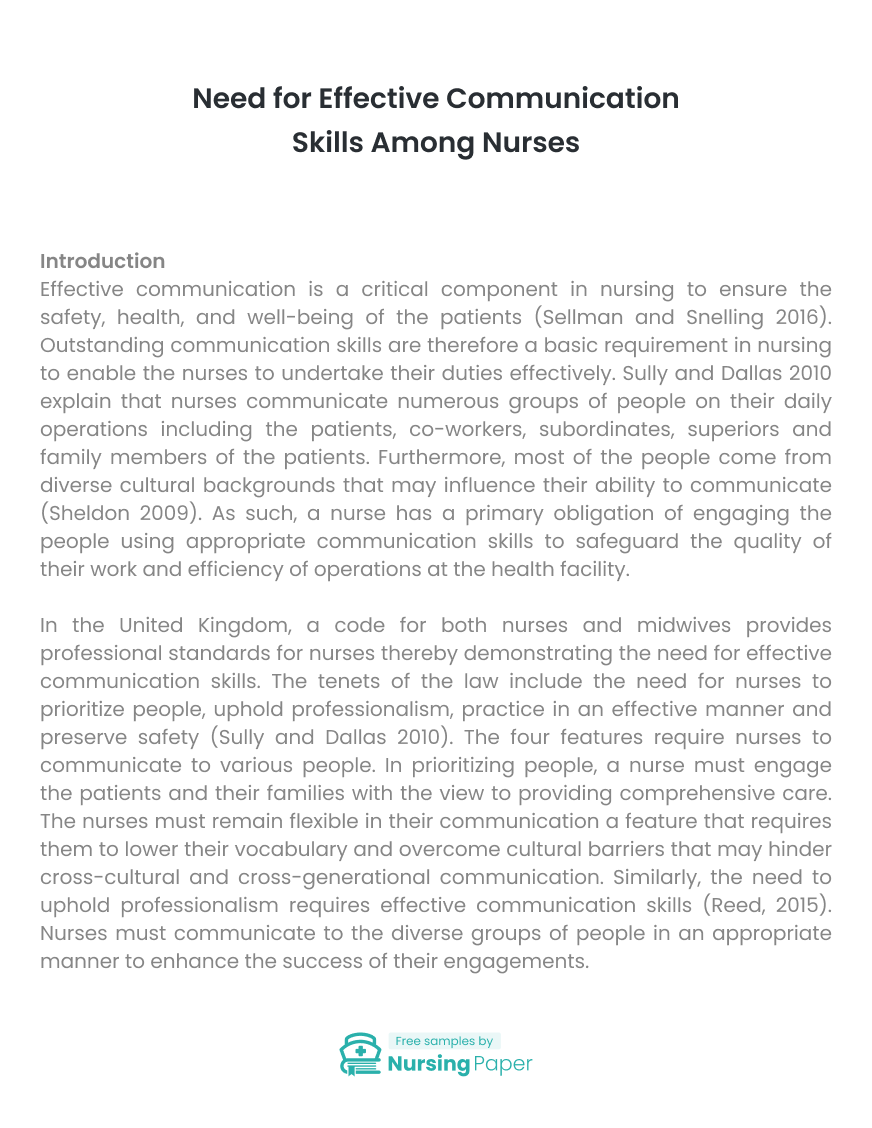
Need for Effective Communication Skills Among Nurses
Introduction
Effective communication is a critical component in nursing to ensure the safety, health, and well-being of the patients (Sellman and Snelling 2016). Outstanding communication skills are therefore a basic requirement in nursing to enable the nurses to undertake their duties effectively. Sully and Dallas 2010 explain that nurses communicate numerous groups of people on their daily operations including the patients, co-workers, subordinates, superiors and family members of the patients. Furthermore, most of the people come from diverse cultural backgrounds that may influence their ability to communicate (Sheldon 2009). As such, a nurse has a primary obligation of engaging the people using appropriate communication skills to safeguard the quality of their work and efficiency of operations at the health facility.
In the United Kingdom, a code for both nurses and midwives provides professional standards for nurses thereby demonstrating the need for effective communication skills. The tenets of the law include the need for nurses to prioritize people, uphold professionalism, practice in an effective manner and preserve safety (Sully and Dallas 2010). The four features require nurses to communicate to various people. In prioritizing people, a nurse must engage the patients and their families with the view to providing comprehensive care. The nurses must remain flexible in their communication a feature that requires them to lower their vocabulary and overcome cultural barriers that may hinder cross-cultural and cross-generational communication. Similarly, the need to uphold professionalism requires effective communication skills (Reed, 2015). Nurses must communicate to the diverse groups of people in an appropriate manner to enhance the success of their engagements. A nurse must master the skills necessary to communicate with a patient and differentiate a patient from a coworker or a superior thereby communicate with each public appropriately and successfully (McCabe, 2013).


The professional commitment of nursing in the United Kingdom further relies on six core values, which also reflect the importance of effective communication. The values include Care, Compassion, Competence, Communication, Courage and Commitment (Lawrence, Perrin and Kiernan, 2015). The values strive to ensure that nurses offer excellent care. Communication is at the center of the work of a nurse. In showing courage, for example, a nurse must have the ability to explain to the patient, their families and the managers of the health facilities to eliminate any conflicts (Gimenez, 2011). Effective communication implies that nurses should understand cultural differences and overcome any obstacle that may hinder such communication. Nurses should also learn to listen to understand the other parties as a key way of ensuring success in the communication process (Bach & Grant, 2011). Understanding body language is yet another element ofeffective communication. The nurses must have the capacity to understand the body language of the patients to help tailor a comprehensive care.
In retrospect, nurses must have effective communication skills since communication is critical to the roles of nurses in their profession. Webb 2011 asserts that the ability to communicate and pass messages in a clear and succinct manner helps save time thereby reducing the workload for nurses. The inability to communicate effectively, on the other hand, can degenerate a bad situation in a health facility thereby causing undesirable consequences such as altercations and fist fights that would, in turn, slow operations and make the work environment both unhealthy and unproductive.
1. Bach, S., & Grant, A. 2011. Communication & interpersonal skills in nursing. Exeter, England: Learning Matters.
2. Baillie, L and Black, S. 2014. Professional Values in Nursing. London: CRC Press.
3. Baillie, V. K., Trygstad, L. N., & Cordoni, T. I. 1989. Effective nursing leadership: A practical guide. Rockville, Md: Aspen Publishers.
4. Chang, E. M. L., & Daly, J. 2016. Transitions in nursing: Preparing for professional practice. Chatswood, N.S.W: Elsevier.
5. Gimenez, J. 2011. Writing for Nursing and Midwifery Students. Palgrave Macmillan Ltd.
6. Lawrence, J., Perrin, C and Kiernan, E. 2015. Building Professional Nursing Communication Skills. Cambridge: Cambridge University Press.
7. Lipe, S. K., & Beasley, S. (2004). Critical thinking in nursing: A cognitive skills workbook. Philadelphia: Lippincott Williams & Wilkins.
8. McCabe, C. 2013. Communication Skills for Nursing Practice. Palgrave Macmillan.
9. Reed, S. 2015. Successful Professional Portfolios for Nursing Students. London: Learning Matters.



The download will start shortly.

The download will start shortly.
 Subject:
Health and Social Care
Subject:
Health and Social Care  Number of pages: 5
Number of pages: 5  Subject:
Nursing
Subject:
Nursing  Number of pages: 4
Number of pages: 4  Subject:
Health and Social Care
Subject:
Health and Social Care  Number of pages: 5
Number of pages: 5  Subject:
Nursing
Subject:
Nursing  Number of pages: 4
Number of pages: 4  Subject:
Medicine
Subject:
Medicine  Number of pages: 6
Number of pages: 6  Subject:
Medicine
Subject:
Medicine  Number of pages: 4
Number of pages: 4  Subject:
Health and Social Care
Subject:
Health and Social Care  Number of pages: 6
Number of pages: 6  Subject:
Nursing
Subject:
Nursing  Number of pages: 7
Number of pages: 7  Subject:
Medicine
Subject:
Medicine  Number of pages: 5
Number of pages: 5  Subject:
Health and Social Care
Subject:
Health and Social Care  Number of pages: 4
Number of pages: 4  Subject:
Nursing
Subject:
Nursing  Number of pages: 3
Number of pages: 3  Subject:
Health and Social Care
Subject:
Health and Social Care  Number of pages: 6
Number of pages: 6  Subject:
Nursing
Subject:
Nursing  Number of pages: 9
Number of pages: 9  Subject:
Nursing
Subject:
Nursing  Number of pages: 10
Number of pages: 10  Subject:
Nursing
Subject:
Nursing  Number of pages: 7
Number of pages: 7 
